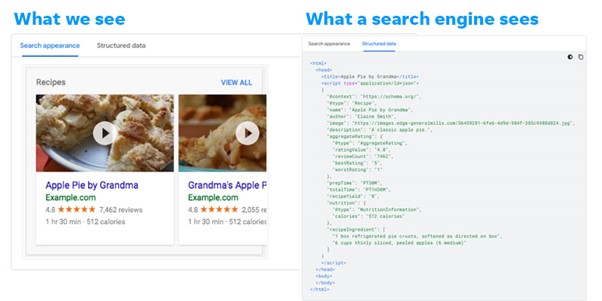Did you know schema markup is important in ensuring your website ranks well on SERPs? Despite this, fewer than a third of websites use it. This blog aims to explain what schema markup is, its benefits, and how to use it to leverage your SEO efforts.
In this blog we will cover:
What is schema markup?
How can I add schema to my website?
Quality guidelines for schema
Why is schema markup important for SEO?
What is schema markup?
Search engine crawlers have limited capabilities in understanding what is on your web page, so we need to add some structured data to help them understand.
Schema markup or structured data is the code that search engines use to read and understand a webpage’s content. The code transforms unstructured data into structured data. This code helps search engines to categorise your content.

Image credit – Quote from Schema.org
There are 3 distinct types of schema markup; RDFa, Microdata, and JSON-LD. Google’s preferred schema is JSON-LD. The example below shows you what we as humans see versus what a crawler or search engine sees. The code gives information to the search engine which includes, the type (recipe), name of the recipe (Apple Pie by Grandma) as well as a description of the image and the recipe ingredients. Now that the search engine has enough data to understand, this recipe may now feature in the recipe snippet on the search.

Image credit – Google
How can I add schema to my website?
Thankfully, you don’t need a vast amount of technical knowledge to add schema to a webpage. You could add structured data direct to your HTML code, although that would require some coding experience. However, there are many tools out there that can do the job for you! Schema.org has a community that creates and maintains a shared vocabulary of schema. In addition, Schema.dev is one of many free programs that help you to add schema to your website.
If you are one of the 43% of websites that uses WordPress, you can get plenty of plugins which integrate with the site, including
Once you have entered your schema onto your website, you should test it to ensure that it is working efficiently and correctly. You can use the schema validator which is recommended by Google.
After implementing schema, you will need to wait a few weeks to allow search engines to re-crawl your site. Alternatively, if you have Google Search Console, you can resubmit for indexing through there. To see if schema has positively impacted your average SERP position, you should make a note of the average SERP position for each page before implementing schema and again a few weeks after.
Quality guidelines for schema
You want accuracy in your schema markup because if a search engine becomes aware of any inaccuracies, your webpage could be flagged as spam.
- Content – This should be accurate and up to date. You must not markup misleading content such as fake reviews or make false claims; if your page is about you, then it should be marked up as you – not someone else!
- Relevance – You should markup content with the right labels. For example, live streaming of a sports event, should not be labelled as a local event.
- Completeness – You should specify all properties. If you miss any out, your content will not be eligible for a rich result.
- Location – Always include your location in schema if you want to be found via location.
- Specificity – Always use the most specific type applicable to your page.
- Images – Ensure the image is relevant to the page on which it is. For example, the images we have used on this page are relevant to the subject.
- Multiple items – This means that there is more than 1 kind of thing on a page. You need to ensure each one is marked up. For example, your recipe could have a video, an image gallery, and a review snippet.
Why is schema markup important for SEO?
While schema is not a direct ranking signal to Google, we do know that it makes crawlers understand the contents of a webpage. Here are a few ways in which schema markup is an important aspect of SEO:
- Schema can help you gain rich snippets – Because search engines know exactly what your webpage is about, that can help you gain rich snippets. Featured and rich snippets get more clicks and impressions than those websites that are lower down the page on a search engine.
- Schema can help your business be seen locally – Using schema can also help your business be featured in a local pack (listing your business name, opening hours, website, and directions). Imagine someone is travelling to your area and will want to stop for food. They may search “restaurants in [your area].” With schema, your restaurant may show up in their search, which can lead to their booking and visiting your restaurant.
- Schema helps the visibility of your webpages in SERPs – Even if your web page is not in the number 1 spot, schema can still help it stand out. If you have reviews that show up, this can act as social proof for your website and make people want to click on your site.
- Overall SERP ranking can be increased – By understanding your content, search engines can ensure that your content is seen by the right people (i.e., comes up in the correct search terms). If your content is showing up in relevant searches, you could see an improved click-through rate (CTR).
- Improved return on investment – If you are gathering more clicks to your website, you may also note an uptake in sales and ROI.
We hope this blog helps you to understand schema and its benefits. If you are interested in more valuable content like this, then sign up for our newsletter today.






